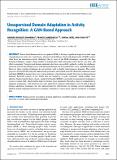Unsupervised domain adaptation in activity recognition : a GAN-based approach
Abstract
Sensor-based human activity recognition (HAR) is having a significant impact in a wide range of applications in smart city, smart home, and personal healthcare. Such wide deployment of HAR systems often faces the annotation-scarcity challenge; that is, most of the HAR techniques, especially the deep learning techniques, require a large number of training data while annotating sensor data is very time- and effort-consuming. Unsupervised domain adaptation has been successfully applied to tackle this challenge, where the activity knowledge from a well-annotated domain can be transferred to a new, unlabelled domain. However, these existing techniques do not perform well on highly heterogeneous domains. This paper proposes shift-GAN that integrate bidirectional generative adversarial networks (Bi-GAN) and kernel mean matching (KMM) in an innovative way to learn intrinsic, robust feature transfer between two heterogeneous domains. Bi-GAN consists of two GANs that are bound by a cyclic constraint, which enables more effective feature transfer than a classic, single GAN model. KMM is a powerful non-parametric technique to correct covariate shift, which further improves feature space alignment. Through a series of comprehensive, empirical evaluations, shift-GAN has not only achieved its superior performance over 10 state-of-the-art domain adaptation techniques but also demonstrated its effectiveness in learning activity-independent, intrinsic feature mappings between two domains, robustness to sensor noise, and less sensitivity to training data.
Citation
Rosales Sanabria , A , Zambonelli , F & Ye , J 2021 , ' Unsupervised domain adaptation in activity recognition : a GAN-based approach ' , IEEE Access , vol. 9 , pp. 19421-19438 . https://doi.org/10.1109/ACCESS.2021.3053704
Publication
IEEE Access
Status
Peer reviewed
ISSN
2169-3536Type
Journal article
Description
The work was supported by the Italian MIUR, PRIN 2017 Project ‘‘Fluidware,’’ under Grant N. 2017KRC7KT.Collections
Items in the St Andrews Research Repository are protected by copyright, with all rights reserved, unless otherwise indicated.

